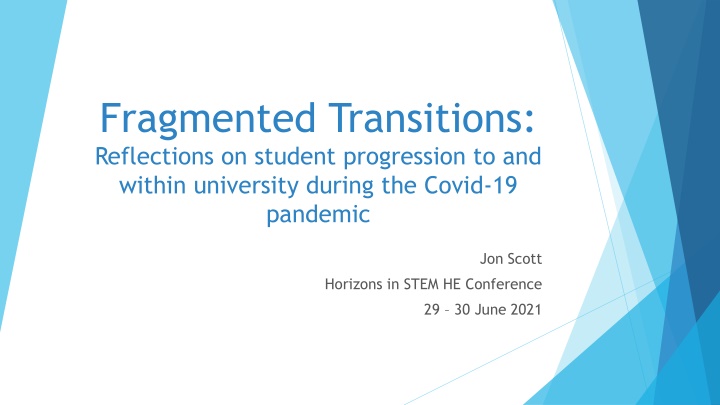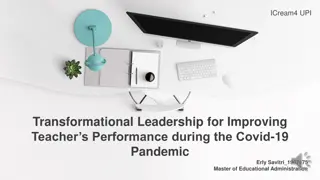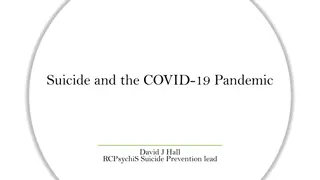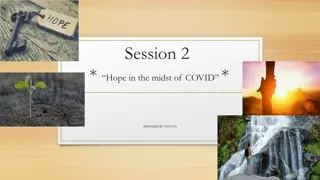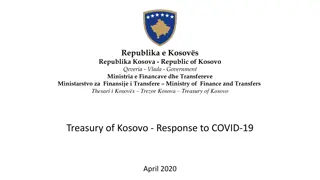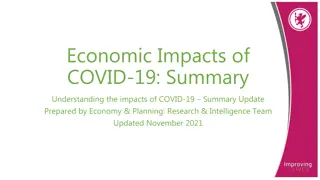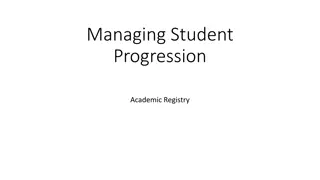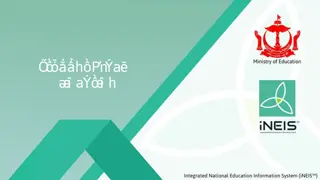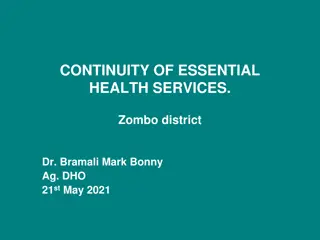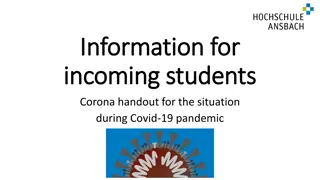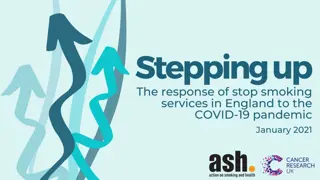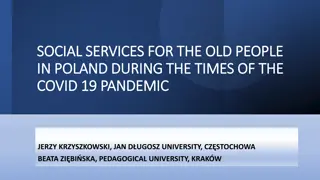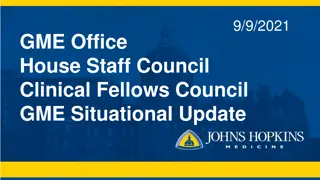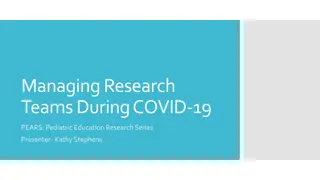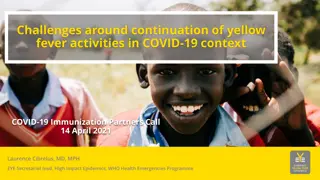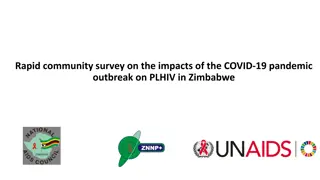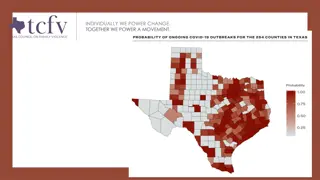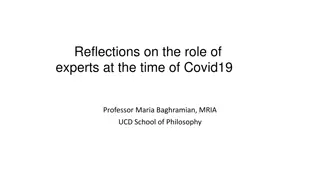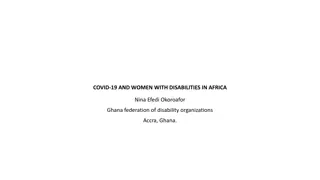Student Progression During Covid-19 Pandemic: Reflections and Challenges
This content reflects on the fragmented transitions of students within university in the midst of the Covid-19 pandemic. It discusses the individualized nature of transitions, institutional persistence, challenges faced by students, and key factors widening academic disadvantage. Data on UK UCAS applications, student domicile shifts, and study experiences are also explored.
Uploaded on Feb 23, 2025 | 0 Views
Download Presentation

Please find below an Image/Link to download the presentation.
The content on the website is provided AS IS for your information and personal use only. It may not be sold, licensed, or shared on other websites without obtaining consent from the author.If you encounter any issues during the download, it is possible that the publisher has removed the file from their server.
You are allowed to download the files provided on this website for personal or commercial use, subject to the condition that they are used lawfully. All files are the property of their respective owners.
The content on the website is provided AS IS for your information and personal use only. It may not be sold, licensed, or shared on other websites without obtaining consent from the author.
E N D
Presentation Transcript
Fragmented Transitions: Reflections on student progression to and within university during the Covid-19 pandemic Jon Scott Horizons in STEM HE Conference 29 30 June 2021
Transitions are recognised as more individualised, reflective and fragmented. (Holdsworth, 2006) institutional persistence [consists] of three major stages or passages separation, transition and incorporation (Tinto, 1988)
At least half of college was what went on outside the classroom, among the students, with no adults around. (Moffat, 1989)
UK UCAS Applications for 2021 Total Number of UK UCAS Applicants 520000 500000 No of Applicants 480000 460000 440000 420000 400000 2012 2013 2012 2015 2016 2017 2018 2019 2020 2021 % of 18 Year Old UK Applicants by IMD Quintile 60 % of Applicants 50 40 30 20 10 0 2012 2013 2012 2015 2016 2017 2018 2019 2020 2021 Quintile 1 Quintile 2 Quintile 3 Quintile 4 Quintile 5 UCAS Application Data 18/02/21
Some key factors widening academic disadvantage for year 13 students Level of resource availability and provision by schools Access to IT equipment and at times suitable for studying Access to reliable internet provision Availability of study space Parental support and additional tutoring
Student domicile during the pandemic* Proportions of university students living at home 80 70 60 % of Students 50 40 30 20 10 0 Pre-pandemic Autumn 2020 January 2021 Social Grouping ABC1 Social Grouping C2DE 41 50 64 BAME *Data from the Sutton Trust report Covid-19 and the university experience February 2021
Study experience for students* Proportion of students experiencing inadequate study space during the pandemic 30 25 % of Students 20 15 10 5 0 Had attended Private School Social Grouping ABC1 Social Grouping C2DE White BAME *Data from the Sutton Trust report Covid-19 and the university experience February 2021
Skills development for HE students* 87% of students reported negative impact on skills development, particularly wider social development 85% of students felt the pandemic had made it harder to establish friendship groups^. 87% of students reported encountering barriers to participating in extra-curricular activities: only 30% engaged in sports/societies compared with 54% pre-pandemic. > 75% of students reported being worried about being able to gain the skills needed for employment. *Data from the Sutton Trust report Covid-19 and the university experience February 2021 and ^UPP Foundation Survey data tables 2021
Student Mental Health 73% of 18 24 year old students reported worsened mental health during lockdown (Mind) 78% reported that their worsened mental health made it harder to maintain friendships* 55% reported feeling lonely on a daily or weekly basis much higher for some minority groups^ 60% of students know how to access support Students report the biggest challenges this year have been the lack of face-to-face contact and teaching, practical experience and access to facilities *UPP Foundation Survey data tables 2021; ^cibyl report 2021
Knowledge retention and concept understanding in 1st year bioscience students. 2020 entry cohort 30 % of student responses 2019 entry cohort 20 10 1 2 5 4 0 3 Response scores Jones et al (2021) Journal of Biological Education, https://doi.org/10.1080/00219266.2021.1941190
Attainment rates in degree outcomes Access and participation resources (2021) Office for Students
transition... integration incorporation development So, where from here? Communication, Communication, Communication: For incoming students providing guidance and reassurance about university life making them count as individuals . awareness of where they come from and building their confidence that they can cope both socially and academically Ensuring clear guidance about the support systems in place for all students Quality of feedback and using more personalised approaches Supporting staff with re-thinking assessment and associated feedback More authentic and personalised approaches. (?) Fewer assessments Reflecting more on skills and less on facts.
So, where from here? Supporting social (re-)integration around SUs, societies and sports ensuring they are accessible. Supporting academic (re-)integration using peer learning, practical classes etc. to (re-)build cohort adhesion. Recognising the pressures on staff.
references Accenture (2021). University: the best time of our lives? Accenture & cibyl Holdsworth, C. (2006), Don t you think you re missing out, living at home? Student experiences and residential transitions. The Sociological Review, https://doi.org/10.1111/j.1467-954X.2006.00627.x Jones, H.L., Zini, V., Green, J.R., Prendergast, J.R. & Scott, J. (2021). Do examinations prepare students for higher education? A lesson from the Covid-19 lockdown. Journal of Biological Education, https://doi.org/10.1080/00219266.2021.1941190 Mind (2021). Student mental health during coronavirus. https://www.mind.org.uk/information- support/coronavirus/student-mental-health-during- coronavirus/#HowIsCoronavirusAffectingStudentMentalHealth Last accessed 23/06/21 Moffat, M. (1989). Coming of age in New Jersey: College and American culture. New Brunswick. NJ: Rutgers University Press. Montacute, R. & Holt-White, E. (2021). Covid-19 and the university experience. Sutton Trust Research Brief. https://www.suttontrust.com/our-research/covid-19-and-the-university-experience-student-life- pandemic/. Last accessed 11/06/21 Neves, J. & Hewitt, R. (2021). Student Academic Experience Survey. AdvanceHE & HEPI https://www.hepi.ac.uk/wp-content/uploads/2021/06/SAES_2021_FINAL.pdf Last accessed 24/06/21 Office for Students (2021). Access and participation resources. Findings from the data: sector summary. https://www.officeforstudents.org.uk/media/4dcf0f63-4ff0-4df2-ba52-3b2ef0a8a28d/access-and- participation-data-resources-sector-summary-2021.pdf Last accessed 18/06/21
references (contd) Tinto, V. (1988). Stages of student departure: reflections on the longitudinal character of student leaving. The Journal of Higher Education 59 (4) 438-455. https://doi.org/10.1080/00221546.1988.11780199 UCAS (2021) 2021 Cycle Application Figures January Equal Consideration Deadline. https://www.ucas.com/data-and-analysis/undergraduate-statistics-and-reports/ucas- undergraduate-releases/applicant-releases-2021/2021-cycle-applicant-figures-january-deadline. Last accessed 11/06/21 UPP Foundation (2021). UPP Foundation Survey. https://upp-foundation.org/student-futures- commission/news/students-prioritise-a-return-to-face-to-face-teaching-from-september-2021/ Last accessed 24/06/21
